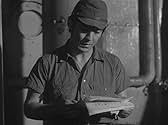अपनी भाषा में प्लॉट जोड़ेंA conscience-driven Japanese soldier traumatized by the events of WWII adopts the lifestyle of a Buddhist monk.A conscience-driven Japanese soldier traumatized by the events of WWII adopts the lifestyle of a Buddhist monk.A conscience-driven Japanese soldier traumatized by the events of WWII adopts the lifestyle of a Buddhist monk.
- 1 ऑस्कर के लिए नामांकित
- 4 जीत और कुल 3 नामांकन
- Kobayashi
- (as Takeo Naito)
- Baba
- (as Akira Nishimura)
फ़ीचर्ड समीक्षाएं
What's really sad is that you can't get the movie on DVD!
What redeems the film and gives it its force is director Kon Ichikawa's imagery and use of music. Aided by his cinematographer Minoru Yokoyama, Ichikawa has many shots that are arresting and that linger in the mind. The most visceral, of course, are the killing fields through which the soldier turned monk Mizushima must pass in order to attain inner peace but for me the most affecting is the shot, from behind, of Mizushima, twin parrots perched on each shoulder, playing "No Place Like Home" on the eponymous musical instrument, child acolyte by his side and Japanese prisoners, behind barbed wire, listening, one hopes attentively and not just sentimentally, to the plaintive song. Which brings me to Ichikawa's use of music, mentioned by several previous reviewers. It is brilliant in its ability to convey the themes of humanity and brotherhood that are at the heart of this eminently good hearted work. In fact, the score is so striking that at times it reminds me of a John Ford film. And where I come from that is high praise, indeed. B plus.
Ichikawa's iconic piece contains a strong anti-war theme that survives beyond its 1945 setting. Mizushima's troop are timeless, soldiers dreaming of homes, wives, town festivals; clinging to nostalgia to guide them home and fighting on for each other rather than any greater cause inspired by the imagined national community. Much more identifiable with the period are the troop holding out against the British even after national surrender, fanatics looking to die for an Emperor who has forsaken them rather than return to their families and rebuilding of the community. Among these men, there are no songs.
Mizushima's conversion from soldier-musician to selfless monk symbolises a state of reflection that follows all armed conflict. The film has been criticised for failing to confront the barbarism of the Imperial army, but this lack of identification with specific national failings is what gives the film a theme that transgresses to other cultures, conflicts and evils - the coming to terms with a life to be lived in the aftermath of horror. The flaws on the Yamato spirit may not be interrogated, but the atrocities of war are present, most visibly in Mizushima's encounter with the rotting flesh of fallen comrades being picked over by scavenger birds.
The framing is impeccable, and those looking for a quintessential Japanese aesthetic will be surprised by the extensive use of closeups. The music is spare and suitably evocative of military camaraderie and frightened young men coping far from home. Mizushima's journey is both symbolic and highly plausible, as is the reaction of his brothers-in-arms. Great cinema in its own right, and at the very top of the tree in anti-war movies.
In July, 1945, a Japanese platoon in Burma gets captured by the British army. One of the men - named Mizushima - has to go to the mountains to convince another Japanese platoon to surrender. But the latter platoon refuses to do so and all the members get killed in a shootout. As Mizushima walks back to his platoon, he comes across the bodies of more soldiers who perished in the war. Thus he sees his new mission in life: no longer can he be a soldier, but becomes a Buddhist monk, with the aim of healing all affected by the war.
I see Mizushima as representing what Japan as a society had to do following its defeat in WWII. Aside from the fact that the Land of the Rising Sun has had to be a pacifist country (the US forced it to have a constitution prohibiting military intervention), the bombing of Hiroshima made the Japanese people averse to militarism in general. Certainly this movie's anti-war stance makes it all the more relevant in this day and age. I recommend it.
The film takes its name from a Burmese harp acquired by Mizushima. He has become an expert harpist and plays while the soldiers sing beautiful chorales with a sound so lush it feels as if it is coming from the Mormon Tabernacle. While the depiction of the soldiers may be idealized, The Burmese Harp transcends its limitations to become a universal testament not only to the madness that prevailed in Burma, but to the unspeakable horror of all war. Ichikawa, in spite of the fact that film became a classic, loved the story so much that he filmed it again in 1985.
क्या आपको पता है
- ट्रिवियाViewers familiar with गॉडज़िला (1954), may recognize many of the cues present in The Burmese Harp's soundtrack, as composer Akira Ifukube adapted Godzilla's requiem theme into several pieces heard throughout the film.
- गूफ़The modern harp (with its pedal changes and its consequent ability to make changes of harmony, in particular)that is played throughout on the film's soundtrack does not match the much more basic instrument shown in the film.
- भाव
Captain Inouye: [Excerpt from Mizushima's letter, which Captain Inouye reads to his men as they sail back to Japan] As I climbed mountains and crossed streams, burying the bodies left in the grasses and streams, my heart was wracked with questions. Why must the world suffer such misery? Why must there be such inexplicable pain? As the days passed, I came to understand. I realized that, in the end, the answers were not for human beings to know, that our work is simply to ease the great suffering of the world. To have the courage to face suffering, senselessness and irrationality without fear, to find the strength to create peace by one's own example. I will undergo whatever training is necessary for this to become my unshakable conviction.
- कनेक्शनFeatured in Ai no onimotsu (1955)
- साउंडट्रैकHanyuu no Yado
(Japanese Version of 'Home Sweet Home')
टॉप पसंद
- How long is The Burmese Harp?Alexa द्वारा संचालित
विवरण
- रिलीज़ की तारीख़
- कंट्री ऑफ़ ओरिजिन
- भाषाएं
- इस रूप में भी जाना जाता है
- El arpa de Birmania
- फ़िल्माने की जगहें
- उत्पादन कंपनी
- IMDbPro पर और कंपनी क्रेडिट देखें
बॉक्स ऑफ़िस
- US और कनाडा में सकल
- $20,015
- US और कनाडा में पहले सप्ताह में कुल कमाई
- $4,569
- 20 अक्तू॰ 2024
- दुनिया भर में सकल
- $33,763
- चलने की अवधि1 घंटा 56 मिनट
- रंग
- ध्वनि मिश्रण
- पक्ष अनुपात
- 1.37 : 1
इस पेज में योगदान दें





























